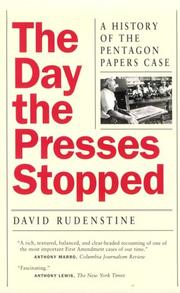Check nearby libraries
Buy this book

Commissioned by Defense Secretary Robert McNamara and classified as "Top Secret - Sensitive," the 7,000-page Pentagon Papers traced the U.S. involvement in Vietnam from the 1940s through the late 1960s. In 1971 Daniel Ellsberg made the study available to the New York Times, which struggled for three months over whether and how to publish the report. On June 13, 1971, the Times finally went to press with the government's secret history of its land war in Southeast Asia.
Publication of the Pentagon reports led the Nixon administration to sue the Times for a prior restraint, unleashing a firestorm of publicity and legal wrangling. A mere fifteen days later the Supreme Court freed the Times and the Washington Post, which had also secured a copy of the documents, to continue publishing their Pentagon Papers series.
.
Contrary to dominant perceptions, Rudenstine argues that the government sued the Times not because it feared political embarrassment or wished to further its campaign against the press but because it believed the Pentagon Papers contained information potentially harmful to U.S. security and needed time to assess the harm that publication could cause.
Although he firmly supports the newspapers' victory in the case, Rudenstine asserts that the conflict was far more complicated than has been generally recognized and that the Supreme Court's decision was a resounding vindication of a free press. Rudenstine also identifies the Pentagon Papers episode as the critical experience leading to the Watergate break-in and, ultimately, to Nixon's resignation.
Check nearby libraries
Buy this book

Previews available in: English
Subjects
National security, New York Times Company, Pentagon Papers, Prior restraint, Trials, litigation, Washington Post Company, Pentagon, New York Times (Firm), New York Times (dagblad), Vietnam-oorlog, Nationale veiligheid, Persvrijheid, Washington Post (krant), New york times, trials, litigation, etc., Washington post (washington, d.c. : 1974), National security, united states, New York Times reviewedPlaces
United StatesShowing 2 featured editions. View all 2 editions?
| Edition | Availability |
|---|---|
|
1
The Day the Presses Stopped: A History of the Pentagon Papers Case
July 7, 1998, University of California Press
Paperback
in English
0520213823 9780520213821
|
aaaa
Libraries near you:
WorldCat
|
|
2
The day the presses stopped: a history of the Pentagon papers case
1996, University of California Press
in English
0520086724 9780520086722
|
zzzz
Libraries near you:
WorldCat
|
Book Details
First Sentence
"On a wintry February day in 1968 Washington officials packed the ceremonial East Room of the White House to bid farewell to Robert S. McNamara, who was resigning as secretary of defense after seven years."
Classifications
The Physical Object
ID Numbers
Excerpts
Links outside Open Library
Community Reviews (0)
Feedback?| 3 days ago | Edited by MARC Bot | import existing book |
| August 6, 2021 | Edited by New York Times Bestsellers Bot | Add NYT review links |
| August 23, 2020 | Edited by ImportBot | import existing book |
| May 13, 2018 | Edited by ImportBot | import new book |
| December 10, 2009 | Created by WorkBot | add works page |











